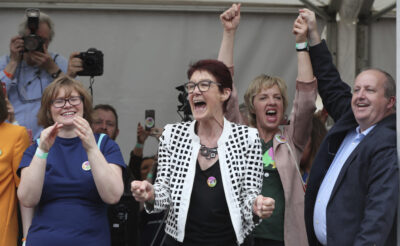Love Letters to the Movement
When Roe v. Wade was overturned, we looked to the wisdom of co-conspirators who’ve been through this fight before. From Mexico to Ireland to Colombia and to the pre-Roe U.S., these love letters bring us hope.


For Our Right to Choose through Freedom of Conscience
A love letter from Mexico City, Mexico
By Aidé Garcia Hernández & Paula Sánchez-Mejorada Ibarra, Católicas por el Derecho a Decidir, Mexico
The overturning of Roe v. Wade was the chronicle of a death foretold. The activists who work for the right to choose knew what was coming. Even so, that Friday, June 24, the news was still bitter.
The official decision came while we were celebrating the decriminalization of abortion in the first 12 weeks of pregnancy in the state of Baja California Sur.
This year has been critical in advancing the right to decide in Mexico: Eight states have joined the list of places where abortion has been decriminalized, and the Mexican Supreme Court issued historic rulings concerning this right. The court was very clear: The absolute criminalization of abortion is unconstitutional, and hindering access to abortion violates human rights. In this context, the regressive decision of the Supreme Court in our neighboring country to the north, which for decades was at the forefront of access to abortion, was even more surprising and contradictory — and somewhat ironic in a country that prides itself on defending individual liberties.
As Catholic women who defend the right to decide, we understand that abortion can be a sensitive issue filled with ethical dilemmas and different emotions. Precisely for this reason, we work so that societies are pluralistic enough to accommodate all beliefs and so that people can use their freedom of conscience to decide on their life plans.
Therefore, the state must guarantee our rights, and religious hierarchies must respect the moral authority of the faithful.
When laws and policies are influenced by conservative and fundamentalist groups, they distance themselves from people’s needs and daily realities and further impact those who already face discrimination. From our perspective, this distance is inconsistent with the Gospel and is very unchristian.
Our fight for abortion access brings powerful and profound transformations, both legal and cultural, in favor of social and gender justice. The growth of the Marea Verde, or Green Wave, which today floods the U.S. as well, is unstoppable. In Mexico, we are seeing the results of decades of collective work.
With this strength, we will continue to stand by the movement in the U.S. to learn and inspire mutually, to continue challenging and changing social norms, to support many feminists in joining and influencing decision-making spaces, and to promote networks of accompaniment filled with sisterhood. Undoubtedly, we will continue advancing together so that no pregnancy is forced, and all parenting is desired and free.
Por Nuestro Derecho a Decidir en Libertad de Conciencia (Español)
La revocación de Roe vs Wade fue la crónica de una muerte anunciada. Las activistas que trabajamos a favor del derecho a decidir sabíamos lo que se venía. Aun así, ese viernes 24 de junio, la noticia no dejó de ser amarga
La formalización de la decisión llegó mientras en México celebrábamos la despenalización del aborto durante las primeras 12 semanas de gestación en el estado de Baja California Sur. De hecho, el último año ha sido un parteaguas para el derecho a decidir en el país: 8 estados se han sumado a la lista de entidades donde el aborto se ha despenalizado y la Suprema Corte de Justicia de la Nación mexicana emitió Sentencias históricas en relación a este derecho. A través de una serie de criterios de vanguardia, la Corte mexicana fue muy clara: la criminalización absoluta del aborto es inconstitucional y obstaculizar el acceso al aborto vulnera los derechos humanos de las mujeres y personas con capacidad de gestar. En este contexto, resultó aún más sorprendente y contradictoria la regresiva decisión de la Corte Suprema de nuestro vecino país del norte (algo irónico en un país que se jacta de defender las libertades individuales), que por décadas estuvo a la vanguardia en el acceso al aborto.
Como mujeres católicas, entendemos que el aborto puede ser un asunto sensible, atravesado por dilemas éticos y emociones diversas. Justamente por eso, trabajamos para que las sociedades sean lo suficientemente plurales para dar cabida a todas las creencias y para que las personas podamos decidir en libertad de consciencia sobre nuestros proyectos de vida.
Por ello, es fundamental que el Estado garantice el ejercicio de nuestros derechos y las jerarquías religiosas respeten la autoridad moral de sus feligresías. Por el contrario, cuando las leyes y las políticas son influenciadas por grupos conservadores y fundamentalistas, se alejan de las necesidades y de las realidades cotidianas de las personas y afectan aún más a quienes ya de por sí enfrentan otras discriminaciones. Desde nuestra perspectiva, esa lejanía es incongruente con el Evangelio y muy poco cristiana.
Nuestra lucha por el acceso al aborto trae consigo transformaciones poderosas y profundas, legales y culturales, a favor de la justicia social y de género. El crecimiento de la marea verde —que hoy también inunda Estados Unidos- es imparable. En México, estamos presenciando los frutos de un trabajo colectivo de décadas, de las que estamos ahora y de las que nos antecedieron.
Con esta fuerza, continuaremos acompañando al movimiento estadounidense para aprender e inspirarnos mutuamente, para seguir modificando las normas sociales, para empujar que cada vez más feministas lleguen a espacios de toma de decisiones y para impulsar redes de acompañamiento sororo. Sin duda, seguiremos avanzando juntas para que ningún embarazo sea forzado y para que todas las maternidades sean deseadas y libres.
 The Right to Abortion: A Tireless Fight for Freedom
The Right to Abortion: A Tireless Fight for Freedom
A love letter from Bogotá, Colombia
By Sandra Mazo, Católicas por el Derecho a Decidir, Colombia
Those of us who have experienced the tensions that abortion can create in our bodies and our faith know that we can affirm peacefully and undoubtedly that the church does not condemn women who have abortions. Throughout its more than 2,000-year history, there has not been a monolithic understanding of abortion in the Catholic church.
Although some within the church have an inflexible opinion on the right to choose, not all in this community of faith share the same viewpoint. These opinions are not unanimous and have not always been unanimous, despite what they pretend.
On the contrary, from its origins to the present, discussion of abortion within the Catholic church has invoked compassion, mercy, charity, and reasonable interpretations that recognize moral principles and extenuating circumstances.
In the religious sphere, it is possible to see abortion through the lens of freedom of conscience. Through open conversation, we can understand that abortion is above all a human issue.
As Católicas por el Derecho a Decidir, which is translated as Catholics for the Right to Decide, we stand with women and all people who can become pregnant, accompanying them, welcoming them, respecting them, and reaffirming with them out loud that parenting should be an option and never an obligation.
The ups and downs in the various regulatory, political, and sociocultural changes that have brought debate on abortion to our countries recently — either to move forward as in Colombia or to go backward as in the United States — show us once again that a set of laws to regulate abortion is not enough by itself. We need to pay attention and keep defending every victory we have achieved.
To the women and people who can become pregnant in the United States, especially those who suffer the most discrimination and socioeconomic inequities, we want to tell you that you are not alone.
Here we are, the organizations of women and feminists from around the world, especially Latin America and the Caribbean. From this South full of struggles, dreams, and resistance, we remain present and unstoppable in our tireless commitment to point to paths of solidarity toward the right to decide.
El Derecho al Aborto, Una Lucha Incansable por La Libertad (Español)
Quienes hemos vivido en cuerpo propio y desde adentro de nuestra fe las diversas tensiones que el tema del aborto puede generar, sabemos que podemos afirmar con toda convicción y tranquilidad que la iglesia no condena a las mujeres que abortan. Tras más 2000 años de historia de la iglesia católica, no ha existido una visión monolítica sobre el aborto, y pese a la postura intransigente de un sector perteneciente a esta institución eclesial con respecto al derecho a decidir, no toda esta comunidad de fe comparte esa misma idea, no es unánime ni siempre ha sido así como nos lo pretenden mostrar. Por el contrario, desde sus orígenes hasta el presente, la discusión sobre el aborto dentro de la iglesia católica ha invocado la compasión, la misericordia, la caridad einterpretaciones razonables que reconocen los principios morales y circunstancias extenuantes.
En el ámbito religioso, es posible ver el aborto desde una perspectiva de libertad de conciencia. Hay una conversación abierta que nos permite entender que el aborto es un asunto ante todo humano. Como Católicas por el Derecho a Decidir, estamos del lado de las mujeres y las personas con capacidad de gestar, acompañándolas, acogiéndolas, respetándolas y reafirmando con ellas a viva voz que la maternidad debe ser una opción y nunca una obligación.
Así, los vaivenes y los diversos rumbos normativos, políticos y socio-culturales que en estos últimos tiempos han traído el debate del aborto en nuestros países — ya sea para avanzar como ocurrió en Colombia o para retroceder como en los EEUU—, nos demuestra una vez más que no basta por sí sola la existencia de un conjunto de leyes para regular el aborto. Esto también pasa por cuidar y defender cada conquista que vamos ganando
A las mujeres y personas con capacidad de gestar de los Estados Unidos, especialmente a las que padecen más discriminaciones y desigualdades socio-económicas, queremos decirles que no están solas. Aquí estamos las organizaciones de mujeres y de feministas en el mundo, y especialmente en Latinoamérica y el Caribe, que desde este Sur cargado de luchas, sueños y resistencias seguimos presentes e imparables en esta apuesta incansable que señala caminos solidarios para el derecho a decidir.

Look to the South
A love letter from Bogotá, Colombia
By Dr. Maria M. Vivas, director of Oriéntame, Colombia
In February 2022, Colombia fully decriminalized abortion up to 24 weeks because of a lawsuit filed by the Causa Justa movement, whose goal is to bring abortion regulation into public discussion. Before 2006, abortion was entirely criminalized without exception. That year, a high-impact litigation case made progress with the partial decriminalization of abortion. It was a big step toward fully recognizing women’s citizenship and their right to choose. However, as time passed, it became evident that partial decriminalization was not enough. Keeping abortion in the penal code, rather than regulating it like any other healthcare service, created access barriers that stemmed from different interpretations of the same laws. On paper, abortion was partially legal. In practice, abortion could be a crime or a right depending on the gatekeepers’ judgment of the circumstances. Women still faced many barriers, and the law was insufficient.
When we began discussing whether to advocate for removing abortion from the penal code entirely, many of us were scared. We didn’t want to lose what we had achieved. In the end, we managed to completely decriminalize abortion up to 24 weeks and keep the previously approved exceptions for abortions for more advanced pregnancies.
Our success was built on many years of conversations, arguments, setbacks, and the growth of the pro-choice movement. It didn’t happen overnight.
In Colombia and the U.S. alike, abortion bans are violence produced by the state. All abortion restrictions make it more difficult for women and people who need an abortion, especially the most vulnerable, to find safe services. These laws come from the government’s denial of women’s reproductive lives: Not all pregnancies are welcome, healthy, or happen at the right time.
By overturning Roe v. Wade, the U.S. took a giant step backward in democracy. It is time to start new discussions and look for original ways to protect the right to choose and provide safe services. The state does not guarantee rights if they are not demanded.
That’s why what happens from this day forward is in the hands of the movement. And keep in mind that the pro-choice movement does not recognize borders. Progress and setbacks in a country or region are progress and setbacks for everyone. So, it might be time to look to the South and see what could be useful and use it!
Regardless of the law, women and the pro-choice movement will remain creative and supportive. We will always find a way to provide services simply because they are a necessity that arises from the realities that women live. We will find a way because we must face both motherhood and the demands of our full participation in society. And we will find a way because choosing whether to be a parent and acting upon that choice is a legitimate act.

If Catholic Ireland Did It, You Can Too
A love letter from Dublin, Ireland
By Ailbhe Smyth, reproductive rights leader, Ireland
The day the U.S. Supreme Court overturned Roe v. Wade, I thought of all those who would come to clinics that very day for advice, support, and planned abortion procedures, only to be told that everything was canceled indefinitely. Their medical care would be on hold because six justices — all current or former Catholics — ruled that the price of pregnancy should be the loss of the right to bodily autonomy.
The ruling is all the more horrible for being handed down in “the land of the free.” What a mockery of the cherished ideal of American liberty.
Here in Ireland, I wept at the devastating consequences this decision will have on the lives and futures of those who wanted and needed abortions, and especially on those most severely marginalized, including poor, Black, Latina, and other minority women and girls.
I wept bitterly for the stifling impact this judgment will have, inevitably, on the struggle for reproductive rights and justice across the world, because the reality is that U.S. decisions have a global ripple effect.
I wept in sadness but also out of absolute frustration. We — feminists, and human and civil rights activists — have spent over half a century fighting for our right as women to agency and bodily integrity. I grew up in Ireland knowing firsthand the suffering, anxiety, and pure fear that an unwanted pregnancy can bring when abortion is deeply stigmatized and prohibited as a criminal offense.
Beneath our sadness, there is a deep and powerful anger. Anger, as we know so well, is a great motivator and a great mobilizer. There’s nothing like it for moving us out onto the streets to raise our voices, brandish our placards, stamp our feet, and make mayhem; to pay our disrespect to what is passed off as “law and justice”; to refuse and resist; to fight for what we know is necessary for our survival and our freedom. When the law fails us, I believe we are entitled to ignore, undermine, subvert, and disrupt its injustices. We are entitled — obliged, even — to show that the law is a very cruel ass.
So, dearest wonderful compañeras and compañeros in struggle in the United States of America. I send you strength in the days ahead as you work to legalize abortion — as Ireland did just a few years ago. And I send you my anger in all its noisy, disruptive passion, along with my love, my hope, and my belief that through steadfast resistance in many forms, you will prevail. If I have learned one thing in 40-plus years of campaigning, it is that we must never — will never — give up. We will not yield; we will not surrender.
We had real victory in Ireland, though our circumstances were very different. I cannot give you in the U.S. a roadmap to victory, but I am here with you in the struggle for whatever lies ahead. In the meantime, the fight continues!
 We’re the Leaders We’ve Been Waiting for
We’re the Leaders We’ve Been Waiting for
A love letter from Washington, D.C.
By Heather Booth, co-founder of JANE, the pre-Roe underground abortion service.
We’re on a knife’s edge in society — between Tyranny and Freedom.
On one side are those who would destroy the progress we made over the last 50 years and more, including protections for the most intimate decision in a person’s life: when, whether, and with whom to have a child.
On the other side is the possibility that the vast majority — who want to expand our freedoms, protect reproductive freedom, have sensible gun laws, and protect Dreamers and democracy — will not only triumph in the short run, but flourish.
We will determine the result — if we organize, with love at the center. And that is what our movement is doing.
I began organizing in the civil rights movement. I saw that when we organized, listened to people and what they wanted, and challenged illegitimate authority, we won — civil rights and voting rights. I saw the same lessons in the early women’s movement. When we organized, we won — jobs, education, and respect.
When I initiated JANE, the underground abortion service where the women themselves provided 11,000 abortions before Roe v. Wade, we built with love and care. We worked with others who were organizing on the issue, converting that organizing energy into political power. We won. Roe became the law of the land.
We won negotiation on prescription drug prices, won historic investment in climate protections, began to make the wealthiest pay more of what they owe — and we have built overwhelming support for reproductive freedom. Of course, we have much further to go. All of this is possible only if we continue to organize.
We are the secret to the future, to which side of the knife’s edge we will fall or rise.
We are the leaders we have been waiting for. And this is no time to wait. This is the time to act. To turn our anger into action. Our protest into power.
And that is what Catholics for Choice has been doing for almost 50 years. It is talking with people, telling our stories, raising others’ confidence to share their stories, and building our power to hold those who are unaccountable to account.
In the civil rights movement, some called for building the beloved community. That is what we are building.
It is you, the people who do the work every day. When it is too hot, or too cold, or we are too tired, or too bored. It is this beautiful, diverse, messy, creative movement for freedom and justice that can be the deciding force that moves us to Freedom over Tyranny. When we organize, with love at the center, we can win and change the world.

